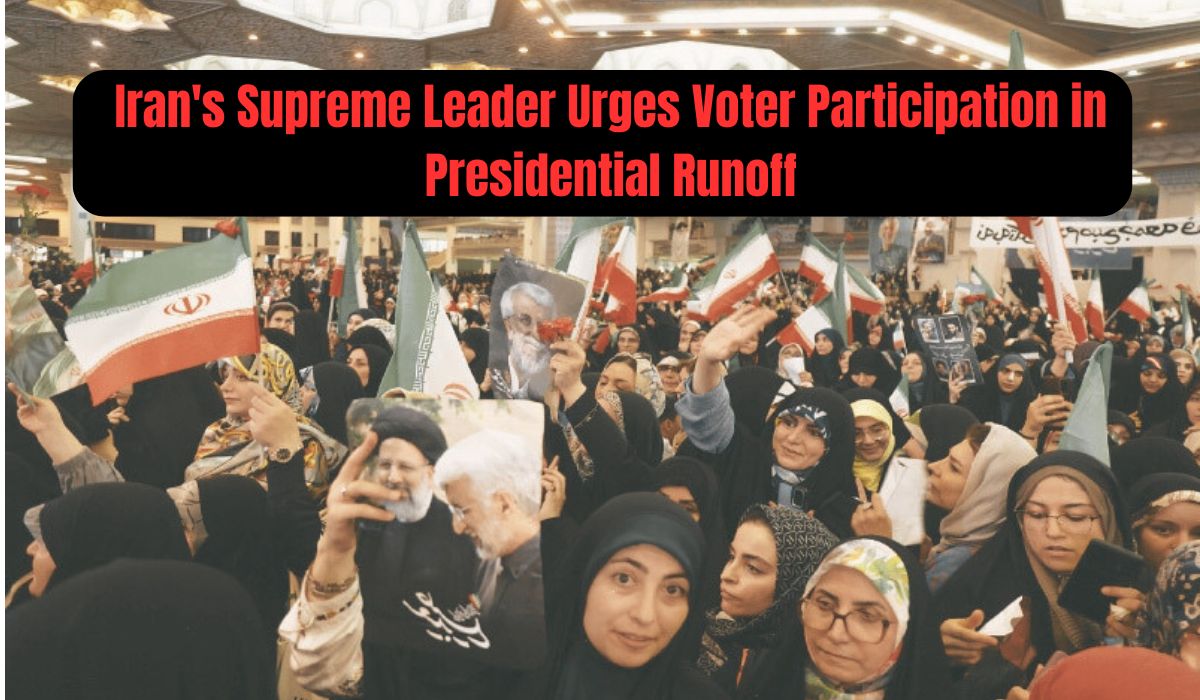Iran’s Supreme Leader Urges Voter Participation in Presidential Runoff in 2024

Iran’s supreme leader, Ayatollah Ali Khamenei, has issued a strong call to citizens to actively participate in the upcoming presidential runoff election. This appeal comes in response to the historically low turnout observed in the initial round of voting held the previous week, which saw a disappointing 40% of eligible voters casting their ballots.
The low participation rate in the first round has raised concerns about the level of civic engagement and the broader implications for the electoral process. With the runoff election scheduled to take place on Friday, Khamenei has underscored the critical importance of a higher voter turnout to ensure the legitimacy and effectiveness of the democratic process.
His call to action highlights the need for greater public involvement and underscores the role of voter participation in shaping the country’s future. By urging citizens to exercise their voting rights, Khamenei aims to bolster the democratic process and address the challenges posed by the previous low turnout, thereby reinforcing the significance of each individual’s contribution to the electoral outcome.
Key Points from Ayatollah Khamenei’s Address
Voter Turnout in the First Round
- Low Turnout: Only 40% of 61 million eligible voters cast their ballots, the lowest since the 1979 Islamic Revolution.
- Clarification: Khamenei stated that not voting in the first round was not an act “against the system.”
Source: Iranian State TV.
Importance of the Runoff
- Crucial Election: Khamenei stressed that the second round is very important and called for higher voter turnout.
- Encouragement: He urged those who did not vote in the first round to participate in the runoff to strengthen the system.
Election Overview
Candidates and Results from the First Round
- Masoud Pezeshkian: Reformist candidate who received 42.4% of the votes.
- Saeed Jalili: Ultraconservative and former nuclear negotiator, who got 38.6% of the votes.
- Runoff Requirement: No candidate received more than 50% of the votes, leading to a runoff between Pezeshkian and Jalili.
Source: Iranian State TV.
Political Support and Alliances
- Conservative Support:
- Mohammad Bagher Ghalibaf: Conservative parliament speaker who won 13.8% in the first round, has endorsed Jalili.
- Other Ultraconservatives: Two ultraconservative candidates who dropped out have also supported Jalili.
- Reformist Support:
- Mohammad Khatami: Former president and reformist leader has backed Pezeshkian.
- Appeal to Voters: Khatami urged voters to participate in large numbers to prevent worsening the situation.
Current Context and Challenges
Regional and Domestic Issues
- Gaza Crisis: The elections are occurring amidst regional tensions over the Gaza crisis.
- Nuclear Program Dispute: There is ongoing conflict with the West regarding Iran’s nuclear program.
- Economic Concerns: Popular discontent is growing over Iran’s economy, which is heavily impacted by sanctions.
Conclusion
Iran’s presidential runoff represents a critical juncture for the country, with profound implications for its political future. In this decisive moment, Ayatollah Khamenei has strongly urged citizens to engage in the electoral process by voting and making their voices heard.
He has highlighted that a higher voter turnout is essential not only for the credibility of the election but also for the nation’s broader future. The runoff is particularly significant given the substantial support and intense campaigning surrounding both leading candidates, each representing different visions for Iran’s direction.
The outcome of this election will play a crucial role in determining Iran’s political trajectory, especially against the backdrop of ongoing regional tensions and economic challenges. With the country facing complex issues on both domestic and international fronts, the choice made by voters will have far-reaching consequences, influencing policy directions and governance strategies.
By calling for increased participation, Khamenei emphasizes the importance of a robust democratic process in shaping a stable and prosperous future for Iran amid these pressing circumstances.
With significant support rallying behind both leading candidates, the outcome of this election will shape Iran’s political landscape amid challenging regional and economic conditions.
References:
- Iranian State TV: Link to Iranian State TV
For more details and updates, stay tuned to news outlets and official announcements.



2 thoughts on “Iran’s Supreme Leader Urges Voter Participation in Presidential Runoff in 2024”